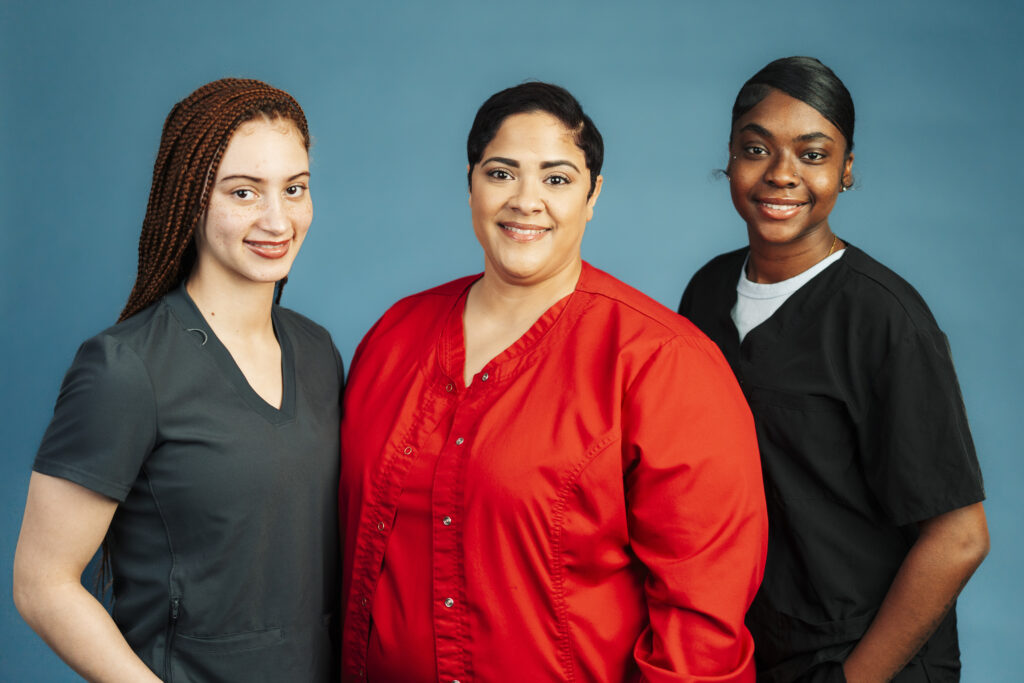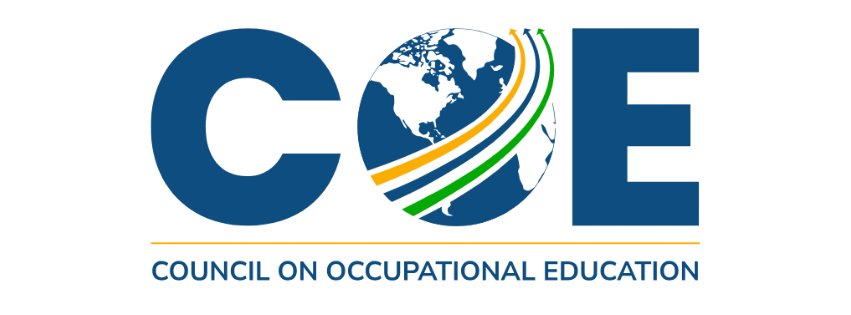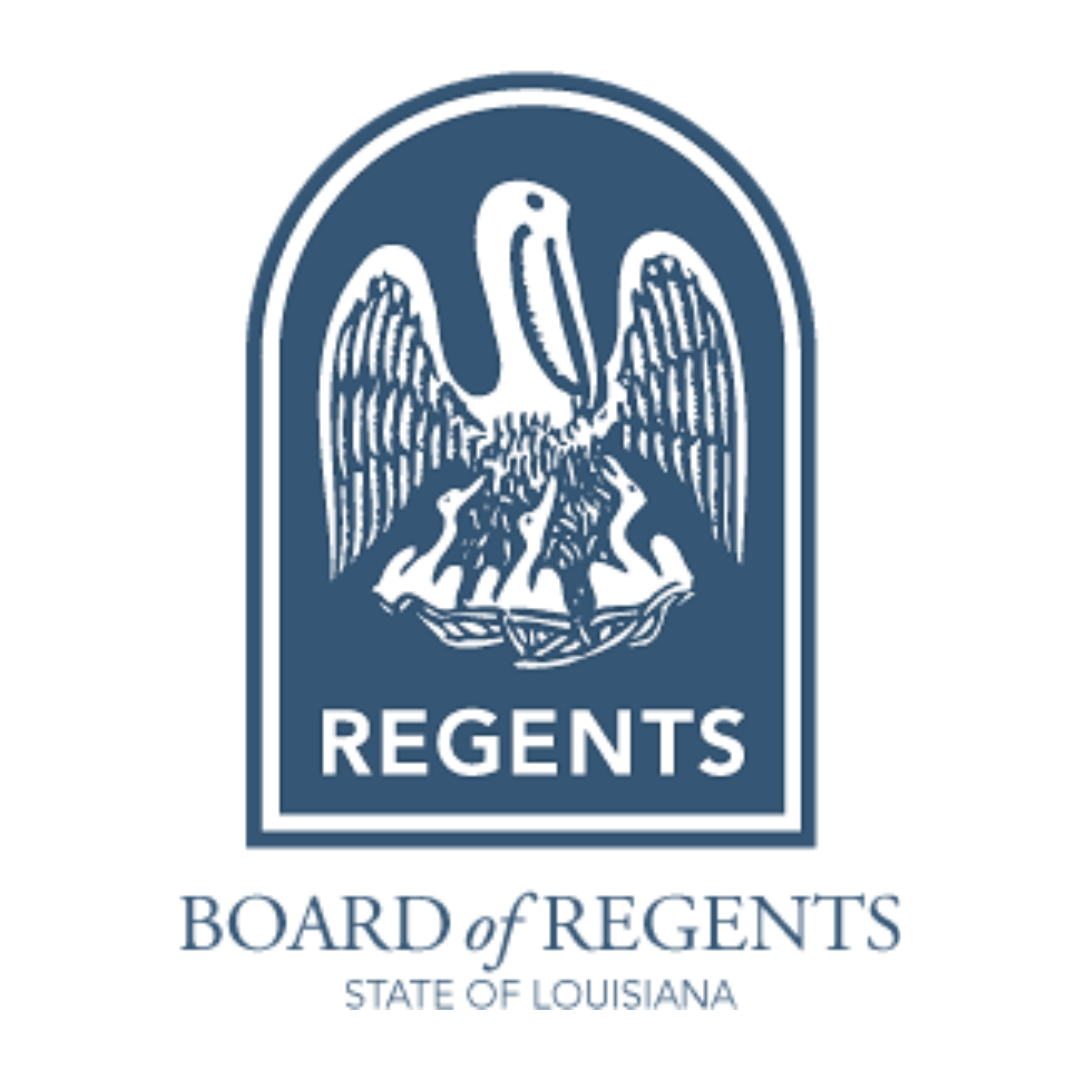EKG/Phlebotomy Technician
From Veins to Vitals, You’ll be Ready to Care for Patients in as few as 9 Months.
Get trained in two essential clinical skills and start making an impact—fast.
Unitech’s EKG/Phlebotomy program gives you the hands-on experience to make a real difference in patient care, one patient at a time. When you choose our EKG/Phlebotomy program, you’ll be prepared for entry-level positions in a variety of medical environments. From learning how to accurately obtain an electrocardiogram (EKG) reading to how to safely and effectively collect blood specimen, our students gain the experience they need. The program includes twelve courses covering the heart, blood drawing techniques, and so much more!
These healthcare technicians have a combination of the skills of EKG specialists and phlebotomists. EKG technicians perform diagnostic tests to help physicians identify and treat heart conditions, and phlebotomy technicians handle the drawing and collecting of blood and urine samples that are used for testing purposes or donations.
This essential healthcare position provides a wide range of services that help patients receive the care they need. Being on the diagnostic side of medicine, EKG/phlebotomy technicians can help make life-saving discoveries.
Gain a strong start in healthcare at Unitech – click through the tabs on the right to learn more.
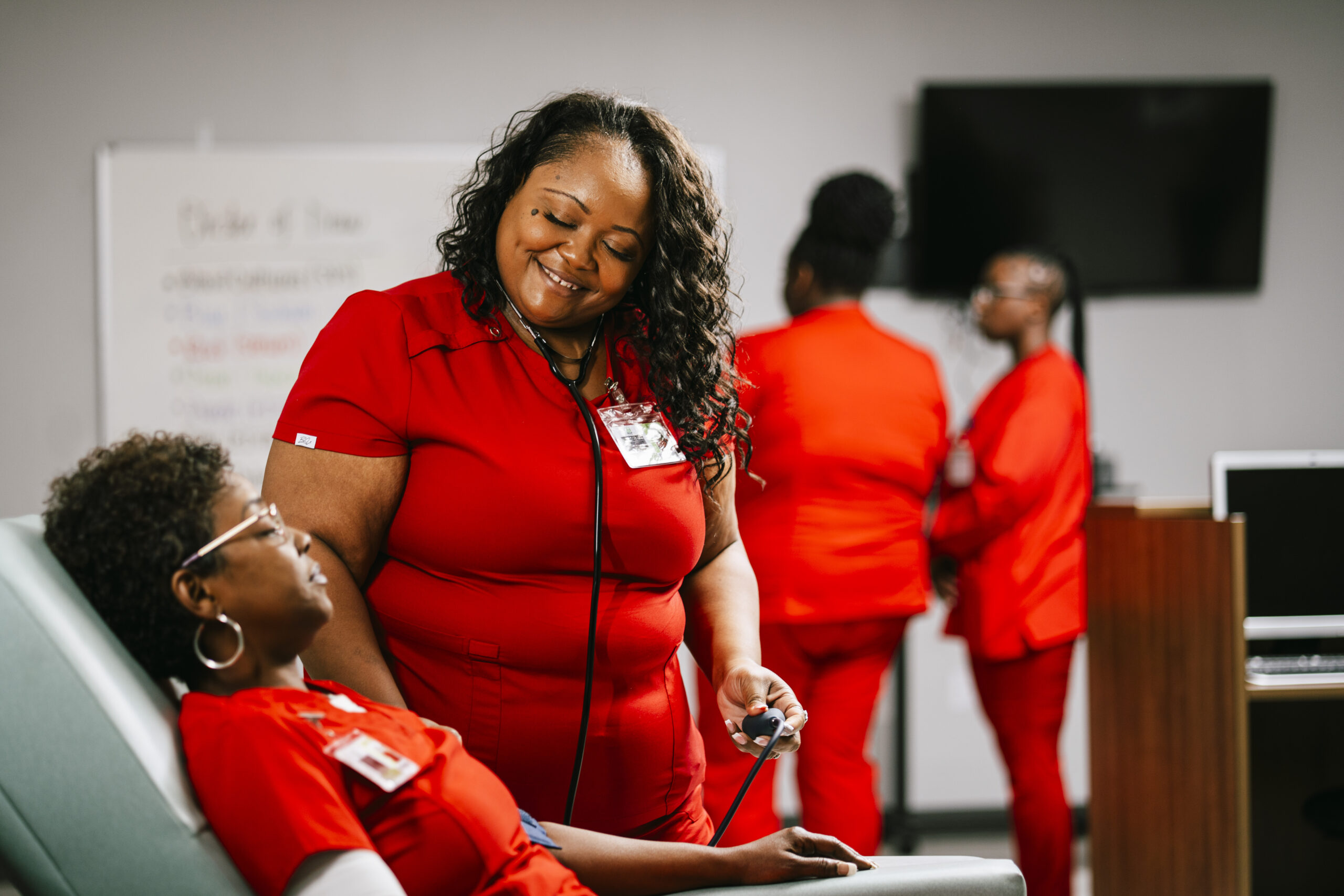
You’ll get hands-on experience, mentorship, and job training you need to succeed at an administrative position in allied health.
- GED or high school diploma required
- Hybrid class schedule
- Dedicated exam prep classes to ensure certification readiness
- Financial aid options available to those who qualify
Students throughout Louisiana can enroll in this hybrid program at campuses in Alexandria, Baton Rouge, Houma, Lafayette, New Orleans, and West Monroe.
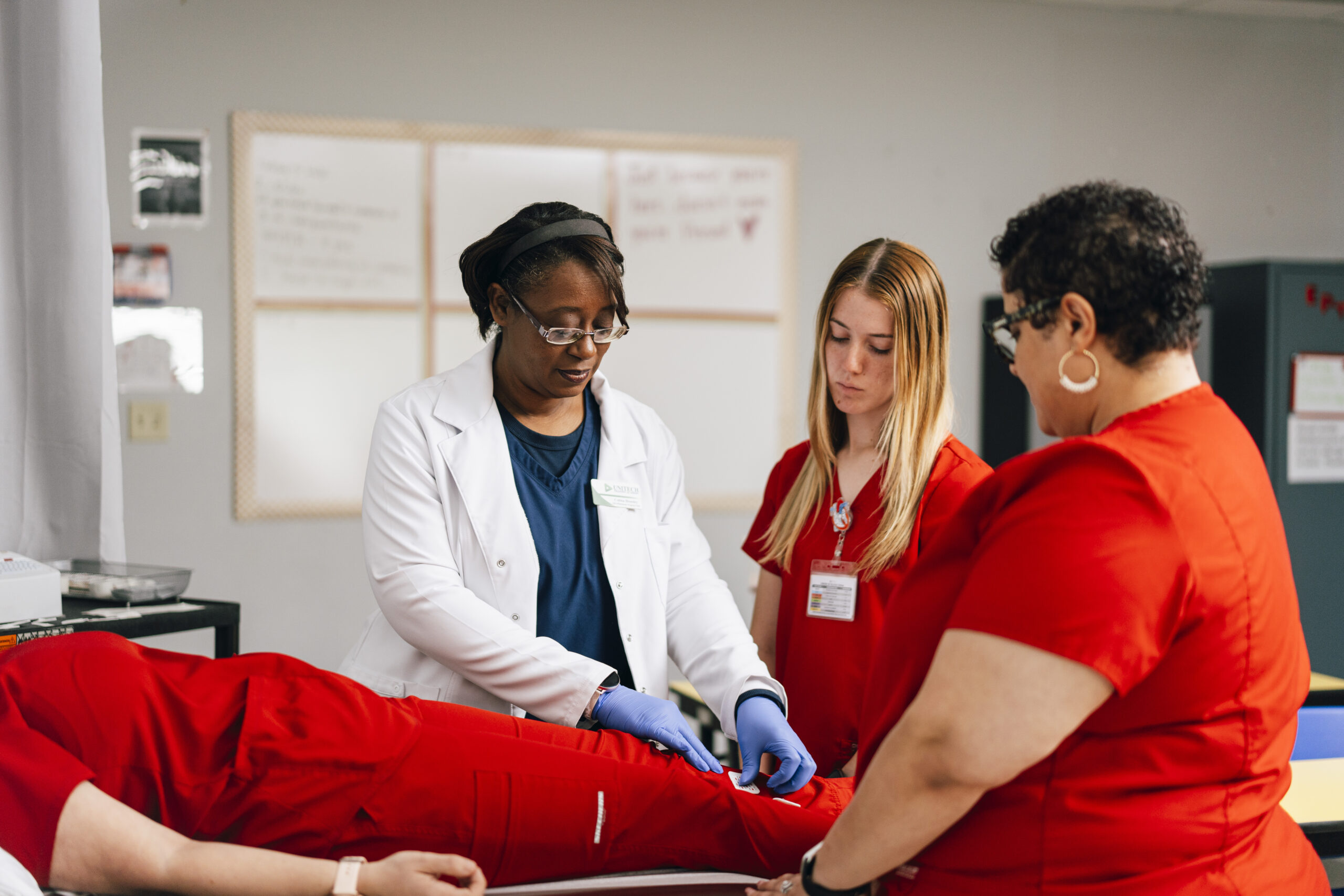
Unitech Training Academy’s EKG/Phlebotomy Technician program helps you gain the knowledge and hone the skills you’ll need to start your career. Our hands-on learning environment and in-depth job training ensure that each student is ready for life after graduation. Our instructors help you understand the practical applications of your lessons, which will help make you a great candidate for open positions in the healthcare field.
You Bring the Steady Hands – We’ll Teach You the Life-Saving Skills.
EKG/Phlebotomy technicians work alongside doctors, nurses, and other healthcare professionals in the diagnostics and testing phases. These technicians collect readings and samples that help physicians determine the root causes of patient’s problems and can help identify conditions that may be otherwise be left unnoticed.
In Unitech’s EKG/Phlebotomy Technician program, you’ll learn how to fulfill the duties of both the electrocardiogram and phlebotomy fields, including:
- Properly attaching electrodes to record the heart’s electrical activity for diagnosis
- Safely collecting samples for testing or donation
- Maintaining patient records and documenting patient test results and information
- Following sterilization and hygiene protocols to control and prevent infection
As an EKG/phlebotomy technician, you’ll be able to enjoy the benefits of
- A Rewarding Healthcare Path: If you enjoy engaging, hands-on tasks, this career allows you to directly interact with patients, perform diagnostic tests, and contribute to treatment plans.
- Career Opportunities: With skills in performing EKGs, drawing blood, and managing patient records, our EKG/Phlebotomy students gain a versatile skill set that opens up numerous career paths in a wide range of medical environments, including hospitals, clinics, labs, and other healthcare settings.
GET HANDS-ON AND BUILD YOUR SKILLS. EXPLORE THE FULL LINEUP AND SEE WHAT YOU’LL BE LEARNING FROM DAY ONE.
EPT161 – Cardiovascular Anatomy and Physiology
This introductory course offers a comprehensive overview of the heart's structure and function within the circulatory system. Students will learn to identify the directional positions of the heart and recognize its key anatomical features. The course will cover the characteristics and roles of three types of cardiac cells, and examine the key differences between arteries and veins. Additionally, learners will diagram the flow of oxygenated and deoxygenated blood through the heart and vascular system, providing a foundational understanding of cardiovascular physiology. This course is ideal for those new to the study of the heart and its functions.
EPT162 – Introduction to Cardiovascular Health and Body System Interactions
This entry-level course covers key concepts in cardiovascular pharmacology and heart electrical function. Topics include myocardial cell functions, electrolyte movement, and electrical conduction, as well as primary and secondary prevention drugs, cardiac medications, and angiotensin hormones. Students will study arrhythmias, beta-blockers, antihyperlipidemic therapy, and the differences between antiplatelet and anticoagulant drugs. The course also addresses drug interactions, patient heart health, and terms like diastole, systole, and cardiac output. Additional content includes pacemakers, intrinsic firing ranges, and conduction abnormalities, providing foundational knowledge in cardiovascular pharmacology and electrical health.
EPT163 – Fundamentals of Cardiac Physiology and Pharmacology
This course provides an overview of cardiac physiology and pharmacology, focusing on the heart's structure, electrical and mechanical processes, and regulation of rhythm and output. Key topics include myocardial action potentials, the cardiac cycle, blood flow, hemodynamics, and pharmacological treatments for cardiovascular disorders. Emphasis is placed on understanding heart function and drug interventions for common heart conditions. By the end, students will have a foundational understanding of cardiac function and related pharmacology.
EPT164 – Cardiovascular Assessment and Diagnostic Techniques
This entry-level course covers essential cardiovascular assessment and monitoring techniques. Students will learn HIPAA privacy laws, vital sign measurements, pulse oximetry, heart rate variability, and jugular venous pressure (JVP). Topics also include the ankle-brachial index (ABI), diabetes classifications, cardiac blood tests, and ECG fundamentals. Students will explore ECG theory, lead placements, and how to perform and document a 12-lead ECG. The course also covers patient consent procedures and assessment tools like SAMPLE and OPQRST. By the end, students will be equipped with foundational skills in cardiovascular diagnostics and monitoring.
EPT165 – Cardiovascular and Diagnostic Monitoring
This entry-level course students will learn to measure key ECG parameters, including duration and voltage, and gain an understanding of waveforms, including the isoelectric line and positive and negative wave reflections. The course covers Einthoven’s triangle and its waveforms, helping students differentiate between key terms such as interval, segment, complex, and wave. Learners will also acquire the ability to calculate heart rate, analyze common ECG rhythms, and identify artifacts. Emphasis will be placed on recognizing limb and precordial lead reversals, understanding normal R wave progression, and mastering the basics of ECG interpretation. This course is ideal for those new to ECG and electrocardiography.
EPT166 – Fundamentals of Cardiac Arrhythmias and Pacemaker Technology
This entry-level course covers the fundamentals of cardiac arrhythmias, including the major classifications and atrial arrhythmias. Students will learn to differentiate between premature junctional complexes and accelerated junctional rhythms, as well as identify the QRS complex differences in ventricular tachycardia and fibrillation. The course also explains pulseless electrical activity vs. asystole, pacemaker spike identification on ECGs, and the basics of pacemakers and implantable defibrillators. Additional topics include pacemaker malfunctions, stages of acute myocardial infarction (AMI), and emergency cardiac medications. Ideal for healthcare professionals new to cardiac rhythm analysis.
EPT167 – Phlebotomy Essentials
This course equips entry-level phlebotomy students with the essential knowledge and skills needed to meet NAACLS competencies, emphasizing ethical practices, patient rights, and legal responsibilities. Students will gain a deep understanding of phlebotomy procedures, quality assurance, and future trends, while also mastering communication, documentation, and computerization in a clinical setting. The course prepares students for professional certification, focusing on practical application through case studies and real-world scenarios related to clinical laboratory activities.
EPT168 – Phlebotomy Fundamentals
This course provides entry-level phlebotomy students with essential skills in infection control, safety, and an understanding of medical terminology and anatomy, aligned with NAACLS competencies. Students will learn procedures for infection prevention, emergency response, and safety in clinical settings, along with a thorough overview of major organ systems, the cardiovascular system, and hemostasis. Emphasis is placed on practical applications, ensuring readiness for professional practice in the phlebotomy field.
EPT169 – Blood Collection and Processing
This course provides essential training for phlebotomists in recognizing and managing patient reactions, handling phlebotomy complications, and ensuring proper sample collection, preparation, and transport. Key topics include understanding how to address different patient responses during venipuncture, dealing with common phlebotomy complications that may result in failed collections, and identifying when samples need to be re-collected or rejected. The course also covers the best methods for preparing and handling samples, including special considerations for temperature-sensitive tests. Participants will learn how to prioritize sample collection, manage blood specimens from patients in special conditions such as those receiving anticoagulant therapy or those with damaged veins, and understand how preexamination errors can affect laboratory results. The course emphasizes safety, accuracy, and efficiency in the laboratory environment.
EPT170 – Phlebotomy Practices
This course provides comprehensive training in blood collection techniques for entry-level phlebotomists, covering essential equipment, venipuncture procedures, and capillary blood collection. Students will learn about various blood collection tools, safety measures, and detailed procedures for effective and safe specimen collection. Emphasis is placed on practical skills, including patient preparation, equipment handling, and performing venipuncture and skin punctures accurately.
EPT171 – Specialized Blood Collection Techniques
This course equips entry-level phlebotomists with essential skills for handling pediatric and geriatric patients, as well as performing specialized and point-of-care collections. Students will learn age-specific care considerations, techniques for collecting blood from various sources, and procedures for blood cultures and advanced testing methods. Emphasis is placed on practical applications, including handling IV lines, central venous catheters, and point-of-care testing for glucose and other parameters.
EPT172 – Advanced Phlebotomy & Nonblood Techniques
This comprehensive course is designed for students with essential knowledge and hands-on skills for mastering phlebotomy techniques, along with nonblood sample collection procedures. It covers the key competencies required to perform safe and accurate blood draws, while also addressing patient diversity and ethical considerations in healthcare settings. In addition to phlebotomy, this course includes in-depth training on nonblood sample collection, such as urine, semen, sputum, throat, fecal (stool), and breath tests, as well as specialized procedures for tuberculin skin tests, drug detection in newborns, and genetic testing.
EPT173 – Externship
Students will apply practical experience in an authorized medical facility as assigned and coordinated by the school.
Tubes, Leads, and Life-Saving Data – You’re the one that can Make it Happen.
As part of the program, students complete an externship in a real healthcare setting within the local community. This experience provides meaningful, hands-on training while also helping students build industry connections and secure valuable job references. You’ll gain 60 hours of real-world experience at a local healthcare site—perfecting your blood draw and EKG skills before entering the workforce.
Our EKG/Phlebotomy Technician program trains students to assist with critical diagnostic and clinical procedures. It covers key skills such as performing electrocardiograms (EKGs), collecting blood specimens through venipuncture, and ensuring proper patient care and safety. You’ll also learn how to use specialized medical equipment like EKG machines and phlebotomy tools commonly used in hospitals, labs, and clinics.
Admissions Tours & Early Engagement
Career Services partners with Admissions during campus tours to introduce our support resources. This builds early trust and highlights the value of resume help and job placement assistance.
Orientation Presentation
During orientation, students learn how Career Services will support them throughout their program. Early connections with coordinators are encouraged to maximize success.
Midpoint Assessment & Career Planning
Around the program midpoint, students complete a career assessment. Coordinators use this to guide personalized planning and keep students on track toward their goals.
Resume Development (60 Days Before Graduation)
Resume building begins 60 days before graduation. Students receive templates and one-on-one support to craft polished, job-ready resumes.
Mock Interviews & Professionalism Coaching
Before clinicals, students participate in mock interviews and receive feedback. This helps sharpen communication skills and builds confidence in professional settings.
Professional Seminars & Career Development
Students attend four seminars on job readiness, professionalism, and workplace expectations. These sessions prepare students to confidently enter the workforce.
Unitech Training Academy cannot guarantee or promise employment; however, reasonable efforts will be made to assist the student in securing employment. Unitech provides career services for all graduates who seek employment. Who will be hired depends on the employer. The employer is influenced by factors such as training, character, attendance/punctuality, personality traits, favorable appearance, work ethic, dependability, and the ability to easily converse with others. The success or failure of the placement efforts of the school will be influenced to a great extent by the attendance, academic records, and personal appearance of the graduate.
Start Strong in Healthcare with Real Skills and Real Support.
Two clinical skills. One powerful career start with Unitech’s EKG/Phlebotomy Technician program. In less than 9 months, students gain the knowledge and hands-on experience necessary to succeed in entry-level positions in healthcare settings. The EKG/Phlebotomy Technician program helps students build the skills required for careers in patient care, specializing in EKG testing, blood collection, and related diagnostic procedures. This hands-on classroom and lab based program offers both theoretical education and practical experience to prepare students for rewarding roles in the medical field.
You’ll get to experience learning in a traditional classroom setting combined with the flexibility of completing a portion of your coursework online. Aside from learning in the classroom, you’ll get immersive and interactive experience in our simulated laboratory settings. Our EKG/Phlebotomy Technician students also complete a clinical externship, gaining invaluable experience before they even graduate. Through your student journey, our instructors and career services coordinators are here to support you from orientation to graduation to beyond as you start your career path!
At Unitech Training Academy, you’re never just a number—and you’re never alone. No matter what program you’re in and whether you’re learning on campus in Louisiana or online across Louisiana, Mississippi, or Alabama, you’ll have real instructors, hands-on training, and a team that’s with you from day one. Our programs are designed to be efficient and focused, helping you build career-ready skills without wasting time. The support, connections, and confidence you gain here? That’s what lasts a lifetime. This is more than school. This is your launchpad—to a career, to confidence, and to a future you’re proud of.
This program is well worth it. You learn everything you need to get a head start in the medical field!
Meagan B
“Unitech and my instructor taught me many things regarding my skills in phlebotomy/EKG, but also to celebrate every victory, big or small. That nothing is impossible, and if you can dream it, you can do it! Student life at Unitech was awesome! It was like this one big extended family, that you never knew you needed until it was yours. Unitech Is full of school spirit, because you have your very own cheer team from the moment you walk in the door. We celebrated everything. From grades to holidays, Mardi Gras floats, and the friends I made, oh I’ll always cherish them.”
Rachal Carr
This program is well worth it. You learn everything you need to get a head start in the medical field!
Meagan B
“Unitech and my instructor taught me many things regarding my skills in phlebotomy/EKG, but also to celebrate every victory, big or small. That nothing is impossible, and if you can dream it, you can do it! Student life at Unitech was awesome! It was like this one big extended family, that you never knew you needed until it was yours. Unitech Is full of school spirit, because you have your very own cheer team from the moment you walk in the door. We celebrated everything. From grades to holidays, Mardi Gras floats, and the friends I made, oh I’ll always cherish them.”
Rachal Carr
What campuses offer this hybrid program?
Unitech’s EKG/Phlebotomy Technician program is offered at the Alexandria, Baton Rouge, Houma, Lafayette, New Orleans, and West Monroe campuses.
What is hybrid?
Unitech’s hybrid programs are offered at our six physical campuses across Louisiana, blending the structure of in-person learning with the flexibility of online coursework. Students attend campus 3 to 4 days a week, depending on whether they’re in a day or evening program (evening availability may vary by campus), while virtual assignments and hours are completed independently and due each Sunday. The online portion of the program is designed to reinforce what you learn in class—helping you solidify your knowledge and apply it confidently in hands-on settings. With a structured schedule and instructor guidance, you’ll stay on track while building skills that translate directly into the real world.
How can I pay for my program?
From grants and student loans to scholarship programs, Unitech’s Financial Aid Officers can help you find the right financial fit for your education. Financial Aid
What is my potential class schedule?
Alexandria
Day- Monday-Thursday on campus - 8:30am-1:30pm
- Fridays are virtual
- 20 hours on campus, 5 hours virtual weekly
- Can be completed in 9 months
- Monday-Wednesday on campus - 5:30pm-8:30pm
- Thursdays & Fridays virtual
- 9 hours on campus, 11 hours virtual weekly
- Can be completed in less than 12 months
Baton Rouge
Day- Monday-Thursday on campus - 8:30am-1:30pm
- Fridays are virtual
- 20 hours on campus, 5 hours virtual weekly
- Can be completed in 9 months
- Monday-Wednesday on campus - 5:30pm-8:30pm
- Thursdays & Fridays virtual
- 9 hours on campus, 11 hours virtual weekly
- Can be completed in less than 12 months
Houma
Day- Monday-Thursday on campus - 8:30am-1:30pm
- Fridays are virtual
- 20 hours on campus, 5 hours virtual weekly
- Can be completed in 9 months
- Monday-Wednesday on campus - 5:30pm-8:30pm
- Thursdays & Fridays virtual
- 9 hours on campus, 11 hours virtual weekly
- Can be completed in less than 12 months
Lafayette
Day- Monday-Thursday on campus - 8:30am-1:30pm
- Fridays are virtual
- 20 hours on campus, 5 hours virtual weekly
- Can be completed in 9 months
- Monday-Wednesday on campus - 5:30pm-8:30pm
- Thursdays & Fridays virtual
- 9 hours on campus, 11 hours virtual weekly
- Can be completed in less than 12 months
New Orleans
Day- Monday-Thursday on campus - 8:30am-1:30pm
- Fridays are virtual
- 20 hours on campus, 5 hours virtual weekly
- Can be completed in 9 months
- Monday-Wednesday on campus - 5:30pm-8:30pm
- Thursdays & Fridays virtual
- 9 hours on campus, 11 hours virtual weekly
- Can be completed in less than 12 months
West Monroe
Day- Monday-Thursday on campus - 8:30am-1:30pm
- Fridays are virtual
- 20 hours on campus, 5 hours virtual weekly
- Can be completed in 9 months
- Monday-Wednesday on campus - 5:30pm-8:30pm
- Thursdays & Fridays virtual
- 9 hours on campus, 11 hours virtual weekly
- Can be completed in less than 12 months
What is my estimated cost of attendance?
2025–2026 Estimated Cost of Attendance
Day Schedule – Living on Own vs Living with Parent| Category | Living on Own | Living with Parent |
|---|---|---|
| Tuition | $15,495.00 | $15,495.00 |
| Registration Fee | $150.00 | $150.00 |
| Lab Fee | $250.00 | $250.00 |
| Housing & Food | $12,087.00 | $4,293.00 |
| Transportation | $3,654.00 | $3,654.00 |
| Personal/Miscellaneous | $2,664.00 | $2,664.00 |
| Total Cost of Attendance | $34,300.00 | $26,506.00 |
| Category | Living on Own | Living with Parent |
|---|---|---|
| Tuition | $15,495.00 | $15,495.00 |
| Registration Fee | $150.00 | $150.00 |
| Lab Fee | $250.00 | $250.00 |
| Housing & Food | $14,773.00 | $5,247.00 |
| Transportation | $4,466.00 | $4,466.00 |
| Personal/Miscellaneous | $3,256.00 | $3,256.00 |
| Total Cost of Attendance | $38,390.00 | $28,864.00 |


